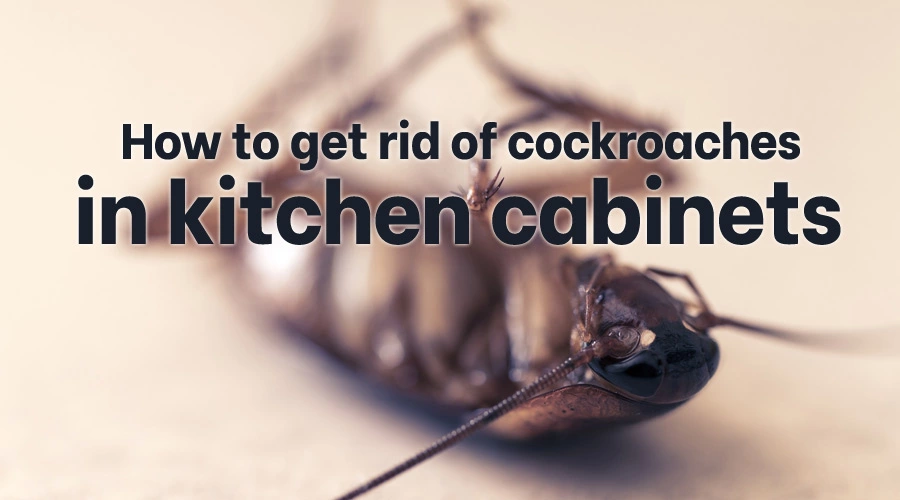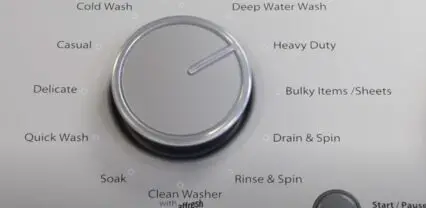Kitchen cabinets have many holes and pipes that cockroaches love hiding in. At the same time, getting rid of roaches in kitchen cabinets is possible. You may be curious, how to get rid of cockroaches in kitchen cabinets?
In general, people believe various smells and sounds are the natural ways to make roaches in your kitchen cabinets gone forever. Or, you can use a wide variety of tools and equipment to help you control the cockroaches.

No matter what methods you are going to use, you still need to understand the underlying reasons behind kitchen cabinets versus cockroaches. First of all, we’ll guide you to the question that asked whether roaches like kitchen cabinets or not.
Do roaches like kitchen cabinets
Roaches spend most of their lives hiding. House areas are their favorite places to hide, and kitchen cabinets are no exception. Compared to other house areas, kitchen cabinets are most likely to provide the temperatures roaches need to sustain their lives.
Kitchens also belong to the areas in which we will often find food wastes. Even when we’ve cleaned up the kitchens, the smells and the wastes’ traces will sometimes remain. Such conditions apply to kitchen cabinets. No wonder roaches like to dwell in kitchen cabinets so much.
Why kitchen cabinets have roaches
Kitchen cabinets can have cracks, molds, and other additional “accessories” that draw roaches closer. Those are the places where we store all forms of food. At some points, people place lots of expired foods and food wastes around the cabinets. These entire things are the things that attract roaches.
If roaches have previously invaded your kitchen cabinets, and you somehow forget to wash or spray the roaches’ corpses, their “friends” will likely come inside or around your kitchen cabinets. If your kitchen cabinets connect to pipes, these would be the favorite places for roaches to get in.
How to get roaches out of kitchen cabinets
Roaches are so versatile that you can always find them everywhere. Some cockroaches move so fast that we realize they just went out from our cabinets a few minutes after they got in our kitchen cabinets.
Thus, it makes sense that we can just let them be. After all, roaches will eventually get out by themselves.
Unfortunately, the adage is true: It’s easier to say than done. Letting the roaches roam freely inside our room areas, including kitchen cabinets, can be the least stressful way.
Yet, we should understand that roaches produce bacterias that are dangerous for our health. From there on, we conclude that we should get rid of cockroaches, no matter their types and no matter if they are adults or not.
How to get rid of small cockroaches in kitchen cabinets
Small cockroaches are roaches that have reached early childhoods. Baby roaches have to undergo 6-8 week growth processes to be small cockroaches.
Nymphs are their alternative names. Their body colors are white and will get brown as they age. As with baby and adult cockroaches, they can be present in kitchen cabinets.
To get rid of them, you need to throw a glass or two of boiling water. Else, place an empty eggshell inside your kitchen cabinets to prevent them from moving. Powdered sugar is also super-effective in dealing with small cockroaches.
How to get rid of baby cockroaches in kitchen cabinets
Baby cockroaches are roaches that have just hatched from the eggs. Roaches are babies if they are less than six weeks old.
Since they have minuscule-sized bodies, it may be difficult for us to notice them immediately. We may even mistake them for dirt or other particles. Until a few months later, they emerge to their adult versions.
Boiling water is an effective medium to get rid of baby cockroaches. Using roach traps with its’ favorite foods, such as soaps, water, and sugar, also helps make sure even the baby roaches go away from your kitchen cabinets.
How to get rid of German cockroaches in kitchen cabinets
Since German cockroaches are among the most common cockroaches in a house, it’s not unusual to find them dwelling in kitchen cabinets.
Apart from being capable to emit unpleasant odors, these roaches are among the harmful bacteria carriers that can cause asthma symptoms. Their droplets are both gross and can cause infestations around your kitchen cabinets. Those are the reasons you should try your best to annihilate them.
Borid acids, eggshells, and dish soap trap mixtures, also work in getting rid of German cockroaches. As an alternative, you can create a bowl-based DIY trap that consists of petroleum jellies to make the roaches stuck inside the bowl.
Will exterminator get rid of roaches too?
How do i get rid of roaches in my kitchen cabinets naturally
People usually use bug sprays and dozens of other tools to get rid of cockroaches everywhere in their houses. Kitchen cabinets are no exception.
As a result, we can’t cook well because sprays and tools often produce odors that block our respiration systems. Not to forget that sometimes those tools are not kid-friendly or environmentally friendly. Some people decide not to hire exterminators since they can be costly.
Those situations make natural ways some of the most recommendable ways to expel roaches in kitchen cabinets. We can make them go away by using smells and sounds.
What smells keep roaches away
Roaches are living beings, and all living beings have some degree of sensitivities in their senses. Since smells are parts of roaches’ senses as living beings, there are smells that cockroaches can’t tolerate. There are even possibilities that cockroaches will die if they smell any of these.
Cinnamon, citrus, lavender, bleaches, and peppermint leaves, are some smells that people believe will make roaches run away. However, are they that effective? What smells will keep them away from our kitchen cabinets, once and for all?
Those are the things we’d want to uncover. We’ll start with cinnamon first.
Does cinnamon repel roaches
Cinnamons are well-known herbs for condiments and desserts. We might even buy them from nearby supermarkets and place them somewhere around our kitchen cabinets. Their essences can even prevent roaches from climbing up to your kitchen cabinets.
If you want to use these natural ingredients, you need to sprinkle the powders around the kitchens. It means you shouldn’t stop spreading them over the top of your kitchen cabinets. If necessary, sprinkle ground cinnamon powders on the nearby windows to prevent roaches from further breeding.
Do roaches hate citrus
Like cinnamons, citruses are often present in many condiments, desserts, main courses, appetizers, and beverages. They are even easier to obtain and often come with more economical prices than cinnamons. More amazingly, you can make them work in controlling the roaches in your kitchen cabinets.
Mopping your kitchen cabinets with water that contains citruses to some extent helps in keeping roaches away from you. To prevent cockroaches from coming to your kitchen cabinets, you can place a couple of citrus-scented fragrances on each side of your kitchen cabinets.
Do roaches hate lavender
Lavenders don’t only have therapeutic effects. Some mothballs and room fragrances contain lavenders. These are proofs that lavenders can be ultra-effective in dealing with roaches, including those in your kitchen cabinets. If you can make a natural treatment with lavender, why not do so?
Using lavender diffusers is a popular method for repelling roaches and maintaining the cleanliness of your kitchen cabinets. The corners near sinks and cupboards are the ideal types to place the lavender diffusers.
Alternatively, use lavender essential oils to replace bug sprays, for they work almost in the same ways. Yet, lavender essential oils have a much more natural calming effect that will amp up your kitchen and cleaning spirits.
Do roaches hate bleach
We use bleaches to whiten clothes. Sometimes, we use them while combining with other soaps and water to wash our clothes. Since bleaches aim to clean up something, and roaches can’t stand cleanliness, they sure hate bleaches.
We can use these things to our advantage by throwing some bleaches inside pipes, sinks, and other tubes around kitchen cabinets where roaches often dwell. Bleaches are also beneficial when we use them to clean our dishes, so the roaches’ eggs won’t survive. Even so, we shouldn’t overuse them so they won’t ruin our kitchens.
Do roaches hate the smell of bleach
The smell of bleaches is pungent that they can kill roaches in a matter of minutes. Therefore, it’s no surprise that cockroaches hate the smell of bleaches.
Nonetheless, smell alone is not enough to deal with roaches that constantly come to our houses. Nor that they work as an effective bait to cockroaches. For example, when we accidentally mix the smell of bleaches with other foods and clothes, not only that they won’t do anything to the cockroaches, but our health conditions will also be likely to suffer.
Do roaches hate peppermint
Peppermints are not only beneficial for candies, cough drops, teas, and other beverages. If you use them in righteous ways, they can be effective natural ways to get rid of roaches. While it’s true that peppermints, like lavenders, roses, and other scents, are often present in bug repellent products, it’s a natural way that we seek.
Many people proved peppermint essential oils are effective in dealing with insects and pests, including roaches. You can mix these oils with some tablespoons of vinegar to maximize the impact. Use them to clean your kitchen cabinets. Then, rinse your kitchen cabinets with water and mop them using a piece of cloth.
What sounds do cockroaches hate
Smells aren’t the only senses that cockroaches have. As with other living beings, there are sounds that cockroaches can’t tolerate. These sounds can cause varying reactions to cockroaches depending on the sounds’ types.
Even though cockroaches don’t have ears, they internalize, process, and detect sounds through their sensory leg hairs, antennae, and a pair of cerci on the bottom parts of their anatomy. These entire organs are sensitive to vibrations.
In other words, the more vibrating the voices, the more likely roaches can’t stand them. The sounds of people clapping, slamming doors, or stomping, are among the sounds that cockroaches despise the most, especially the latter.
At the same time, if we stomp on cockroaches using heavy footwear, wooden blocks, or any properties with similar weights, the roaches will run even faster. Worse, their droplets can spatter and result in our footwear or blocks getting infested further. Many cockroaches will even remain alive even if we stomped at them.
If we play any music types with heavy bass elements, these things can make cockroaches not enter the room. The same thing also applies when we play the music around our kitchen cabinets. Again, it’s not guaranteeing us to kill the roaches.
How to avoid cockroaches in kitchen cabinets
At some points, cockroaches can be annoying that you can feel tired of always having to deal with their populations. Sometimes, all you need is to avoid them.
Cleaning up your furniture every day should be number one on your to-do lists. All furniture will eventually get dirty, including kitchen cabinets. Use liquid soap instead of bar soap when cleaning up, so cockroaches won’t eat the soaps.
Apart from being unable to stand some smells and sounds, cockroaches avoid mothballs. The most effective places around your kitchen cabinets to place mothballs are on every one of the corners and inside spaces that you use to store kitchen utensils and ingredients to cook.
Prepare at least a broom and a dustpan around your kitchen cabinets to brush away roaches. They may look unimportant when compared to bug sprays and other bug repellent tools, but you’re going to use them to make sure even dead cockroaches won’t stand a chance of invading your kitchen cabinets.
Would you like to learn can i vacuum roaches or can exterminator get rid of roaches?

Dr Philip G Cox currently is a professor in Physiology in the Centre for Anatomical and Human Sciences which is part of the Hull York Medical School and the Department of Archaeology at the University of York. Dr Philip G Cox studied comparative mammalian functional morphology for the PhD in the University Museum of Zoology, Cambridge.



